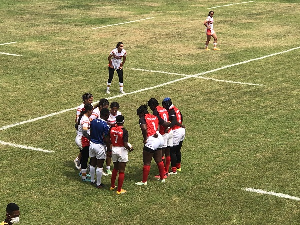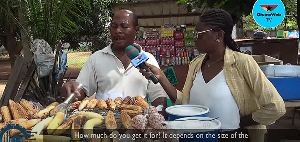Business News of Saturday, 26 October 2013
Source: GNA
Ghana, others embark on $58b ECOWAS rail project
Five countries of the Economic Community of West African States (ECOWAS) are to embark on a West Coast High Speed Rail Project to help bring development to the sub-region.
The countries are Ghana, Cote D’ Ivoire, Nigeria, Togo and Benin, and the project will have its stations in Cotonou, Lome and Accra as well as terminals in Abidjan and Seme/Badagry in Nigeria.
The 1178.84 kilometre project, which is estimated to cost 58.9 billion US dollars, will link Nigeria, Benin, Togo and Ghana to Cote’ D’ Ivoire, to facilitate the movement of people, goods and services within the sub-region.
About 13.1 million dollars is needed to undertake full feasibility studies on the project and funding would involve Public Private Partnership and governments of the beneficiary states.
Addressing an Inter-Member –Country- Ministerial Summit on the project on Friday at Atimpoku in the Eastern Region, Ghana’s Minister of Transport, Mrs. Dzifa Attivor said the project had received tremendous political will and the strong desire of Ministers to see its realisation.
Representatives of Ministers of Transport, International Funding Organisations, Directors of Hammco BTB of Canada and West Africa, experts from the rail sector, directors from the transport sectors attended the summit.
Mrs Attivor stated that the private sector of the sub-region had now seen the importance of the rail infrastructure in the socio-economic development of the communities which would impact positively on the livelihoods of the people.
“The partnership between the public and the private sector is very important and critical and it is against this background that I can say without any shadow of doubt that this project is here to succeed,” she pointed out.
The Transport Minister noted that, of all the modes of transport, be it air, water and road, railway remains the cheapest, and efforts to develop the industry must be given the necessary support.
Mrs Attivor explained that political independence of the ECOWAS region is useless, unless the economic emancipation of the sub-region is fully realised, saying: “one of the surest ways of doing that is to see to the realisation of the Africa High Speed Rail Project”.
She therefore urged participants at the summit to facilitate the transformation of the dreams and ideas into concrete decisions that will ultimately lead to the actual realisation and the implementation of the project.
According to her, the upsurge in cross-border trade, as well as the thriving tourism industry among the 300 million population of the ECOWAS region, should serve as greater motivation for the various governments to accept that “the harvest is great but the labourers are few”.
Mr. Idowu Obasa, Chairman of Hammco BTB, West Africa, said the greatest challenge of the time, was how to give substance and effect to the relationship in the true meaning of Union and as siblings for whom political, economic, cultural and social life means nothing but freedom, progress and development.
He said there is no single policy thrust that best responds to this challenge for progress in the region today than the West Africa Rail Project.
Mr. Obasa noted that through the project, citizens in the union would renew their faith of its founding fathers for a true community of progress.
“This will also deepen the vision of our people for collective self-action, and the greatest promise is we yield a legacy of freedom, growth, peaceful co-existence and development to our children and future generations.
Despite the border lines that exist between the countries, the people of the West African sub-region are actually the same culturally and socially,” Mr. Obasa said.
















